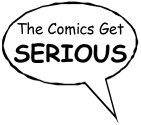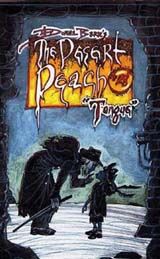

| The Desert Peach: Tongue. By Donna Barr. Bremerton, WA: A Fine Line Press, 1998. 64p. (The Desert Peach, no.28; A Fine Line Press Publication, no.5). $6.00. ISBN 1-892253-04-6. |

|
GENRES: AUDIENCE: NOTE: This book has not been funded by the National Endowment of the Arts. SYNOPSIS: Flashback to spring, 1946. Pfirsich and a "small, tough" boy, Hans, have been wandering around the shattered German countryside, looking for Pfirsich's paramour Rosen Kavalier. Hans is much more interested in getting a meal. Pfirsich zones out, recalling how the Nazis poisoned his brother, Field Marshal Rommel, while Pfirsich was stuck in a hospital bed (his knees were shattered and he had to have multiple operations on them). Another painful memory is of his men and him having to get pissy drunk in order to perform the unwanted duties of a punishment battalion (they had to shoot badly burned and wounded civilians to put them out of their misery). But when Hans insists, Pfirsich reluctantly decides to give up his search for Rosen and go home so that the young boy can have a real life. First, though, they stop at an American POW camp to beg breakfast. Pfirsich, remembering his own experience in such a camp, is loathe to approach, but Hans has no such qualms and quickly informs the American soldier on guard, Lopez, that he's hungry. Lopez is a friendly sort and manages to convince Pfirsich to come in after some fairly cynical but kindly chatter. The two Germans eat. As they prepare to leave, Pfirsich asks whether Rosen is in the camp. Lopez says no, then warns the two to stay off the road, because Mel is about to drive out. Then Mel emerges--and the stunned Pfirsich sees that it's Rosen! Though technically a prisoner, "Mel" seems to have charmed the Americans into obeying him. He is as stunned to see Pfirsich as Pfirsich is to see him. They almost embrace, but Hans stops them doing so in front of Lopez, so Mel pretends that Pfirsich has something important to tell him in private. He hands Hans off to Sue, an American secretary who is clearly in love with the dashing Mel, then confronts Pfirsich in the Colonel's office (he has a LOT of pull in the camp). Mel explains about his name (his real name is Melvin Gonville), how he hasn't gotten into trouble despite being a Nazi party member, how much fun it was to be a Nazi during the early days, and various other reminiscences, including how Pfirsich used to look and behave. Eventually they come to hugs and desire, but Pfirsich pulls back, as having sex in the Colonel's office would be an act of pure folly. Anyway, Pfirsich wants a bath. As Pfirsich bathes, Mel and Hans size each other up. Mel explains how his resemblance to the Colonel's dead son won him his influence, and Hans immediately warms to him, requesting to stay with him. Then Pfirsich emerges, clean and dry and utterly beautiful. Both Mel and Sue can barely restrain themselves from jumping on him. But Mel has to be careful, as the Americans are no more enamored of gays than the Nazis were. The flashback ends, and we return to the pleasant Rommel-Gonville household. Hans, now a young man, joins the two bickerers for breakfast. More secrets emerge, including various black market activities by Hans and Mel, and Hans's real name (Wolfram Hitler, though he is no relation). After breakfast, Pfirsich discovers that the two have been working on his 1948 Tucker, souping it up to make it uncatchable by the police. Infuriated at this desecration of his incredibly rare and valuable car, Pfirsich insists they restore it to its pristine glory, suggesting they get a Rolls-Royce and put in a Rolls-Royce aircraft engine. They thus giving rise to the postwar German legend of "a car that regularly outran both Occupation Soldiers and German police in chases on the Autobahn." EVALUATION: What a range Pfirsich displays in this book: tired, hopeful wanderer; despairing guilt-ridden soldier; dignified, outraged mourner; lovesick boy; concerned father; enraged protector; delighted bather; slightly pompous elder; "classic Peach" in Paris just after the Occupation; shivering refugee; etc. That's pretty impressive for 64 pages! Most novelists can't put their main character through so many phases in ten times that number. Of course, both Rosen/Mel and Hans are delightful; one of Barr's triumphs is making Rosen/Mel such a lovable scoundrel. He's comparable to Mama Rose in Gypsy; he's infuriating and domineering, but you can't help but be attracted to him. Tongue is more of a character study than a "story" per se, serving as it does to introduce Pfirsich and Rosen/Mel's postwar relationship. The flashback scenes, themselves linear, are framed by the "looser" events of the household, which is an interesting juxtaposition and probably would not have worked in less capable hands. Still, one could argue that the book is less successful than Out of the East because its really exciting event (Pfirsich and Rosen's reunion) takes place in the middle of the book, leaving the whole of the book without a comparably satisfying climax. Because there is no real problem presented in the postwar segments, the final fourth of the book drags just a bit. Believe me, I was (and am) extremely interested in their postwar activities, so this didn't really bother me, but I found that the "civilian" events in Tongue stuck in my head less than did those in Out of the East. Quibble, quibble. Of course, highly recommended. |
Return to Rational Magic Home
